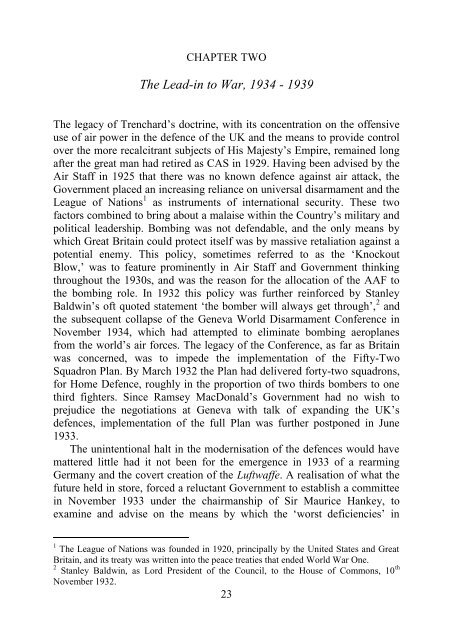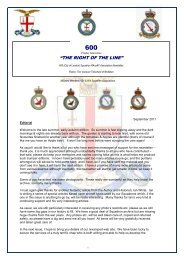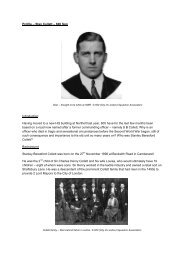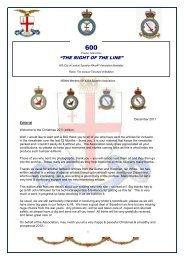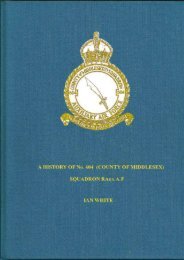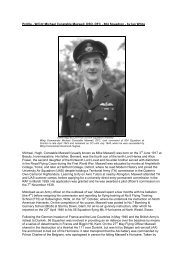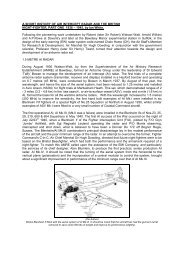- Page 1 and 2: If You Want Peace, Prepare for War
- Page 3 and 4: Acknowledgements The basis of this
- Page 5 and 6: Contents page ACKNOWLEDGEMENTS INTR
- Page 7 and 8: Germany from maintaining and operat
- Page 9 and 10: Table 1 - General Comparisons of AA
- Page 11 and 12: 603, 503, 605, 504 and 501 Squadron
- Page 13 and 14: Francis ‘Joe’ Fogarty, 604’s
- Page 15 and 16: Westland Wapiti IIAs of No.604 Squa
- Page 17 and 18: Two trainee pilots who later played
- Page 19 and 20: 604 Squadron’s officers circa 193
- Page 21 and 22: and was appointed Pilot Officer, AA
- Page 23 and 24: HRH The Prince of Wales and officer
- Page 25 and 26: and an aircraft was sent to RAF Bir
- Page 27: the 13 th , one flight was ordered
- Page 31 and 32: Sir John Simon, in March 1935, Hitl
- Page 33 and 34: Flying Officer John Grandy 6 joined
- Page 35 and 36: for an RAF Volunteer Reserve (RAFVR
- Page 37 and 38: (date not known) for the Air Counci
- Page 39 and 40: George Evans, from a photograph tak
- Page 41 and 42: „We travelled from Mill Hill Stat
- Page 43 and 44: „How horrible, fantastic, incredi
- Page 45 and 46: on 24 th August, 1939 - we had been
- Page 47 and 48: Bristol Blenheim Ifs of 604 Squadro
- Page 49 and 50: Squadron call-sign - „Trophy‟ S
- Page 51 and 52: Ironically it was not the much-vaun
- Page 53 and 54: twin-engined aircraft capable of ac
- Page 55 and 56: the cow. The poor beast was laying
- Page 57 and 58: feeds for the Brownings. During the
- Page 59 and 60: Blenheim Ifs of 604 Squadron at Nor
- Page 61 and 62: it was, the MO was instructed to le
- Page 63 and 64: Lieutenant Davies, with Sergeant Ru
- Page 65 and 66: north put up something of a fight,
- Page 67 and 68: ehind and just below it. Then Hunte
- Page 69 and 70: Commodore Sir Quinton Brand, who ha
- Page 71 and 72: South Cerney in February 1940 to un
- Page 73 and 74: The responsibility for these operat
- Page 75 and 76: the beginning of September 1940 Fig
- Page 77 and 78: got all items properly „installed
- Page 79 and 80:
John Cunningham from a photograph t
- Page 81 and 82:
Further interceptions were made on
- Page 83 and 84:
Philipson, of 604 Squadron, goes th
- Page 85 and 86:
Squadron was completely re-equipped
- Page 87 and 88:
Reverting to his air-gunner trainin
- Page 89 and 90:
Movements and promotions during Feb
- Page 91 and 92:
Rory Chisholm alongside Beaufighter
- Page 93 and 94:
corresponding increase in the inter
- Page 95 and 96:
Trade that evening was brisk, with
- Page 97 and 98:
Officer Crew on the 28/29 th , and
- Page 99 and 100:
and his operator, Pilot Officer Der
- Page 101 and 102:
enemy and within the range of Rawns
- Page 103 and 104:
From the 12 th the interception opp
- Page 105 and 106:
Four Ju 88s from Kustenfliegergrupp
- Page 107 and 108:
were elevated to Flight Sergeant on
- Page 109 and 110:
By the 10 th July 1941, fifty-three
- Page 111 and 112:
As the result of little „trade‟
- Page 113 and 114:
and Pilot Officer Rawnsley, with th
- Page 115 and 116:
and his operator, Sergeant Croysdil
- Page 117 and 118:
training would be understood when h
- Page 119 and 120:
his Beaufighter, but escaped with n
- Page 121 and 122:
On the 2 nd February, Squadron Lead
- Page 123 and 124:
instruments, apart from the standar
- Page 125 and 126:
The remainder of the Squadron‟s a
- Page 127 and 128:
at low angles of elevation and incr
- Page 129 and 130:
all the available bomber resources
- Page 131 and 132:
aware of the presence of 604‟s fi
- Page 133 and 134:
airspeed carefully.‟ This drops
- Page 135 and 136:
eleased airmen for driving the airc
- Page 137 and 138:
extra workshop adjoining the Squadr
- Page 139 and 140:
CO, Group Captain Appleton and the
- Page 141 and 142:
completed, with both air and ground
- Page 143 and 144:
AOC, Air Vice Marshal Dickinson, 28
- Page 145 and 146:
604. Beginning on the 24 th the Squ
- Page 147 and 148:
hours on the 24 th April and were s
- Page 149 and 150:
To counteract Hitler‟s extreme di
- Page 151 and 152:
1943 The Squadron‟s new equipment
- Page 153 and 154:
On the 11 th July, the Squadron was
- Page 155 and 156:
ut not Flying Officer Howard-Willia
- Page 157 and 158:
Leader Joll was forced to land at C
- Page 159 and 160:
Extremely bad weather at Scorton re
- Page 161 and 162:
At some point between December 1943
- Page 163 and 164:
to make me return on one engine. Bu
- Page 165 and 166:
De Havilland Mosquito NF.XIIs were
- Page 167 and 168:
and H.F.Smith (N/Rs) arrived fresh
- Page 169 and 170:
supported by various radars on HM s
- Page 171 and 172:
Command on a staff posting and then
- Page 173 and 174:
Wing Commander Desmond Hughes (abov
- Page 175 and 176:
y 604‟s Engineering Officer, Flig
- Page 177 and 178:
The unknown pilot officer was as go
- Page 179 and 180:
CHAPTER EIGHT The End of the Line,
- Page 181 and 182:
The night of the 7/8 th was similar
- Page 183 and 184:
Flight Lieutenant Meadows, who had
- Page 185 and 186:
On the 17 th September, the British
- Page 187 and 188:
the 1 st December, but, as before,
- Page 189 and 190:
Lieutenants Foster and Newton a bar
- Page 191 and 192:
The weather improved at the beginni
- Page 193 and 194:
efore diving vertically towards the
- Page 195 and 196:
Ground crews with Mosquito XIII at
- Page 197 and 198:
CHAPTER NINE The Cold War & Re-birt
- Page 199 and 200:
of six Harvard and/or Oxfords for f
- Page 201 and 202:
joined on the 27 th by the Adjutant
- Page 203 and 204:
A second air test was completed on
- Page 205 and 206:
Supermarine Spitfire LF.Mk.16es of
- Page 207 and 208:
Lieutenants Lofts and Coltart and F
- Page 209 and 210:
Spitfires flew to London Airport to
- Page 211 and 212:
604 Squadron officers at summer cam
- Page 213 and 214:
Pilot One (P1) 17 Goodman passed hi
- Page 215 and 216:
In order to assess for themselves t
- Page 217 and 218:
Main Party and supervise the unload
- Page 219 and 220:
leaving the Assistant Adjutant to d
- Page 221 and 222:
The exercise was concluded on the 3
- Page 223 and 224:
gallons (1,480 litres), and the abi
- Page 225 and 226:
Assistance Programme and the doubli
- Page 227 and 228:
1950 The availability of a second M
- Page 229 and 230:
Gloster Meteor T.7 trainer of 604 S
- Page 231 and 232:
„In January 1950, our Adjutant No
- Page 233 and 234:
flying competition to decide which
- Page 235 and 236:
the pilots with „their first oppo
- Page 237 and 238:
months mobilisation on the Auxiliar
- Page 239 and 240:
squadron was also introduced to the
- Page 241 and 242:
During the afternoon of the 3 rd Fe
- Page 243 and 244:
Marignane had no stocks of jet-fuel
- Page 245 and 246:
acked around into another maximum G
- Page 247 and 248:
On the 22 nd March, the Squadron ho
- Page 249 and 250:
ventral and auxiliary wing tanks an
- Page 251 and 252:
Consequently, the CO placed a great
- Page 253 and 254:
convened on the Monday, but did not
- Page 255 and 256:
ecome the norm, the aircraft were r
- Page 257 and 258:
604 Squadron pilots Norman Tebbitt
- Page 259 and 260:
ad weather. On arrival at the stati
- Page 261 and 262:
atings and Meteor conversion contin
- Page 263 and 264:
APPENDIX ONE 604 Squadron Key Appoi
- Page 265 and 266:
APPENDIX TWO Appendix 2 - Aircraft
- Page 267 and 268:
UK AIRFIELDS OF 604 SQUADRON BY LOC
- Page 269 and 270:
APPENDIX THREE Enemy Aircraft Claim
- Page 271 and 272:
13/14 July Do 217 W/O Ray & W/O Wal
- Page 273 and 274:
APPENDIX 4 Officers & Pilots of 604
- Page 275 and 276:
CAA CAS CB CBE CFS CFI CH CID CO CR
- Page 277 and 278:
Kampfgruppe (KGr) An independent bo
- Page 279 and 280:
RPM Revolutions per minute. R-R The
- Page 281 and 282:
Howse, Derek, Radar at Sea, The Roy
- Page 283 and 284:
Meadows, Jack: [1] Beaufighter VI v
- Page 285 and 286:
Brand, F/Sgt, 175. Brook, Sgt, 63.
- Page 287 and 288:
Piper, F/Lt, 227, 241, 243, 244. Po


